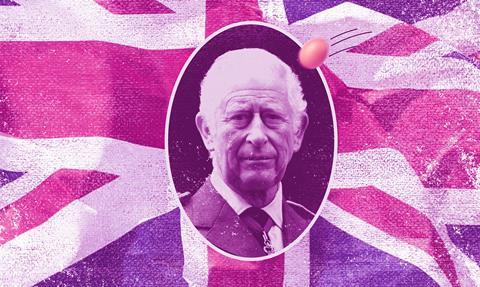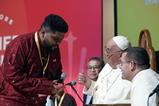There’s only one king Christians should put their hope in, and it’s not Charles, says John Stevens

King Charles was greeted by boos and shouts of “not my king” when he visited Colchester Castle earlier this year. Protesters threw eggs and held up placards as the monarch and Queen Consort entered the Norman fortress. According to the official coronation website, the number of communities registering to hold a street party to celebrate His Majesty this May bank holiday is low (245 at the time of writing), compared to the estimated 16,000 parties that took place to mark Queen Elizabeth II’s Platinum Jubilee. The general public is, it seems, less than excited by the prospect of King Charles III and Queen Camilla.
Republican revolution
With the coronation imminent, it is inevitable that some are asking whether the British monarchy has a future. Ardent republicans hope that the time might be ripe for reconsideration. They focus on the anachronistic nature of hereditary titles, the way monarchy makes us ‘subjects’ not ‘citizens’ and the idea that a royal family legitimates an oppressive class structure. They also draw links to our colonial past, point to the inability of a single family to represent the diversity of Britain today and object to the cost and privileges associated with the aristocracy.
Christians, once grateful for the personal faith of the late Queen, are also asking questions of the new head of the Church of England, who has admitted he would prefer the epithet “Defender of Faith” rather than “Defender of the Faith”.
At present, there are 43 countries in the world (out of 195) that have a monarch. Over the last 120 years, many royal houses have been removed, including those of Russia, Germany, Austro-Hungary, Portugal and, more recently, Barbados.
British republicans are likely to be disappointed, however, if opinion polls are anything to go by. After Queen Elizabeth’s death, a reported 64 per cent of the population said they supported a monarchy, with just 21 per cent opposed. Clearly, some commonwealth realms are distancing themselves from the Crown, but in the United Kingdom, the House of Windsor remains secure – for now at least.
Constitutional monarchy
The great genius of the British monarchy has been its ability to change over time. The monarch has, alternatively, carved out a role as a symbol of imperial power (Victoria), stoicism in the face of war (George VI) and, in the 1950s and 1960s, a model family (Elizabeth II). In recent years, the decline of deference and rise of tabloid journalism has transformed the Windsors into a national soap opera, so we might add ‘celebrity’ to that growing list of permutations.
Much legislation has received royal assent that is incompatible with Christian moral convictions
A major argument for keeping the system we have can be summed up in one colloquialism: if it ain’t broke, don’t fix it. Who would be a better figurehead, standing above politics and connecting us with our national history? We tried revolution before and it didn’t work out. The gains of an alternative system seem, at best, marginal.
Many Christians especially value the unique role of the British monarch as head of the established Church, and were thankful for the personal faith of Queen Elizabeth II during a time of growing secularism. This function of the monarchy, dating back to the Reformation, at least keeps Christianity in the public sphere, even if more honoured in the breach than the observance.
A holy nation
In assessing the validity of the monarchy, Christians will naturally look for guidance to the Bible as the inspired word of God. In the past, some Christians have regarded the nation of Israel as providing the ideal pattern for human government. Edward VI, for example, was often upheld as a latter-day King Josiah (2 Kings 22-23) bringing religious reform to the nation. The Stuarts regarded absolute kingship as divinely sanctioned. However, we cannot straightforwardly apply the Old Testament to our contemporary context. We do not live under a theocracy and, when taken as a whole, the Bible is, at best, ambivalent about kingship.
Scripture does not lay down any preferred form of human government. Israel was originally established as a confederacy of tribes without a single hereditary leader. God later raised up judges to lead his people, but this was hardly a success. It led to everyone doing what was “right in their own eyes” (Judges 17:6, NLT). When the people asked for a king in 1 Samuel 8 it amounted to a rejection of God. Concerned with external appearances, they wanted a king to be “like all the other nations” (v20). Saul proved to be a disaster but God ultimately gave them a king with a heart “after my own heart” (Acts 13:22), the warrior-shepherd David.
The earliest Christians were commanded to honour, respect and obey their pagan human rulers (see Romans 13:1-6), provided that this did not require them to disobey Christ, in which case they should exercise civil disobedience and joyfully suffer the consequences as a testimony to him (see Acts 5:29).
So how does this help us when considering the question of whether Christians should support monarchy?
I find it helpful to consider that the British constitutional settlement of power symbolically resides in the Crown, not the person of the monarch. Its functioning is not dependent on the character or competence of the individual on the throne. The prime minister, as well as members of the government, judiciary and armed forces owe their allegiance not to Charles, but to the Crown. This acts as a limit on executive power and puts leaders in their place – which can only be a good thing. Politicians are rightly criticised if they transgress these boundaries (consider Boris Johnson unlawfully advising the Queen to prorogue parliament in 2019).
Christians should also remember that the religious rights and freedoms we enjoy today are enshrined in Acts of Parliament, not bestowed by the personal protection of the monarch. The Human Rights Act upholds the right to religious freedom and freedom of speech. We are protected by anti-discrimination legislation that makes religious faith a protected characteristic.
While the monarch swears a coronation oath to uphold the reformed faith, we must be honest and recognise that the faith of Cranmer and the 39 Articles is only believed and practised by a small section of the Church of England. In the years since 1952, much legislation has received the royal assent that is incompatible with Christian moral convictions, and heresy has been allowed to flourish in the established churches.
The king who reigns forever
It seems to me that when it comes to models of government, the British version, despite some quirks, has worked satisfactorily for several centuries. We should be grateful for the maintenance of civil peace and for gospel freedom. And we should pray for our governing authorities and give them the respect and honour they deserve. Nevertheless, our hope as Christians is not to be found in any specific human system or person. In a fallen world, all are sinful and flawed.
It is vital we remember that the entire creation is ultimately under the rule of an absolute monarchy. Our father is on the throne and his precious Son, the Lord Jesus, is ruling at his right hand. King David failed, but pointed God’s people forward to the true king we need, the Messiah, who alone can save us and establish God’s rule. His kingdom of perfect peace and justice will come. Our task is to serve and worship him, because we are now citizens of the kingdom of heaven. We are to declare the good news about him to everyone, urging them to bow the knee in submission before he comes in judgement and it is too late.
Our greatest need is not a republican revolution – it is forgiveness and grace
Our greatest need is not a republican revolution that will abolish the House of Windsor. It is forgiveness and grace, because we have rebelled against the one true sovereign who loves us. By nature, we have all conspired in a spiritual revolution against the divine monarchy. The tragic consequences of the dethronement of God in our world are evident all around us. The good news is that it is not yet too late to repent and invite him to take the throne of our lives once again. We need to cry both “God save the king” and “Your kingdom come”.





































No comments yet